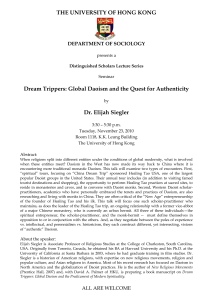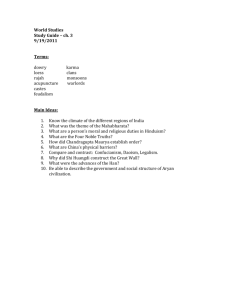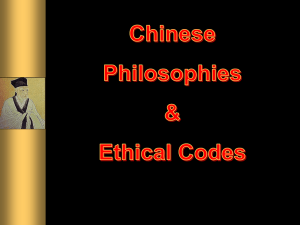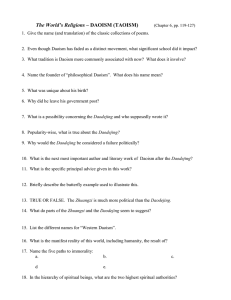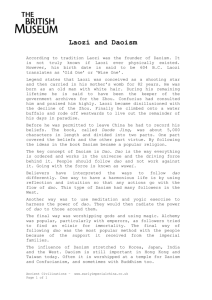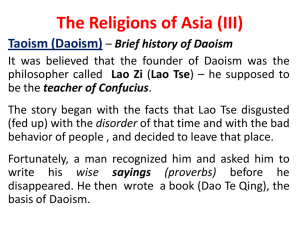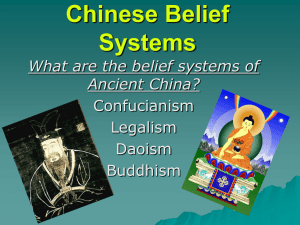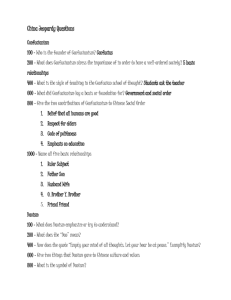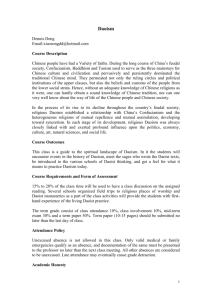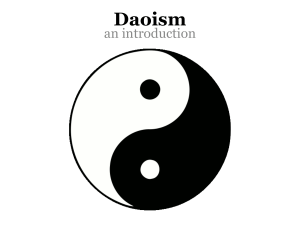REL 10330-1 Introduction to Daoism M & W 3:15
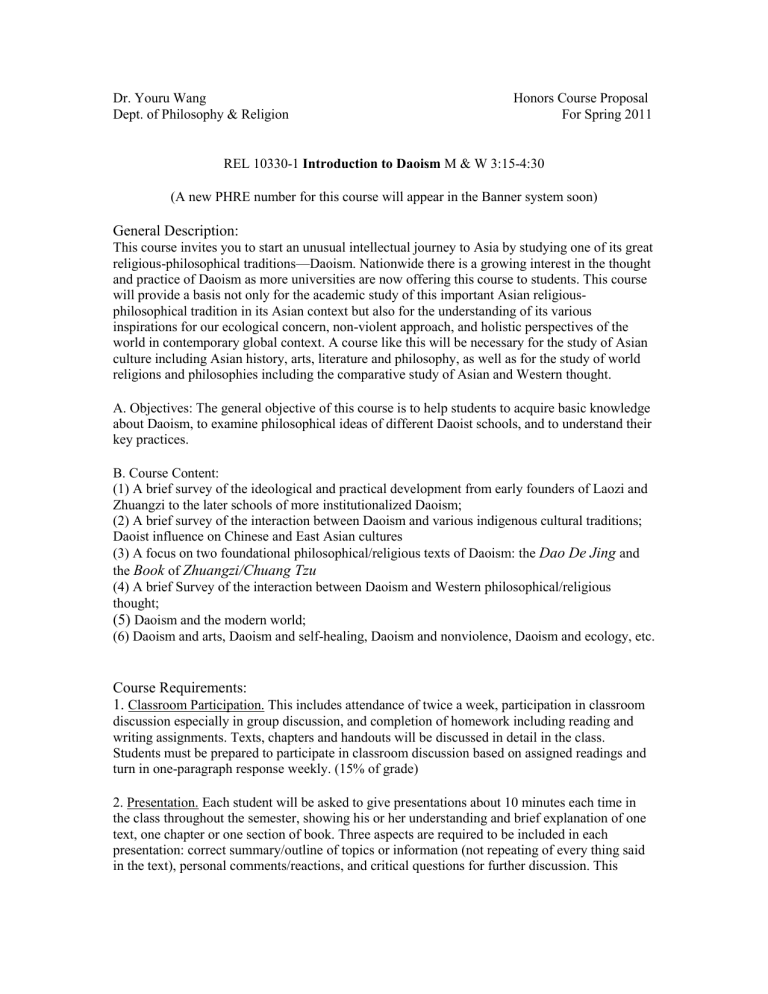
Dr. Youru Wang Honors Course Proposal
Dept. of Philosophy & Religion For Spring 2011
REL 10330-1 Introduction to Daoism M & W 3:15-4:30
(A new PHRE number for this course will appear in the Banner system soon)
General Description:
This course invites you to start an unusual intellectual journey to Asia by studying one of its great religious-philosophical traditions—Daoism. Nationwide there is a growing interest in the thought and practice of Daoism as more universities are now offering this course to students. This course will provide a basis not only for the academic study of this important Asian religiousphilosophical tradition in its Asian context but also for the understanding of its various inspirations for our ecological concern, non-violent approach, and holistic perspectives of the world in contemporary global context. A course like this will be necessary for the study of Asian culture including Asian history, arts, literature and philosophy, as well as for the study of world religions and philosophies including the comparative study of Asian and Western thought.
A. Objectives: The general objective of this course is to help students to acquire basic knowledge about Daoism, to examine philosophical ideas of different Daoist schools, and to understand their key practices.
B. Course Content:
(1) A brief survey of the ideological and practical development from early founders of Laozi and
Zhuangzi to the later schools of more institutionalized Daoism;
(2) A brief survey of the interaction between Daoism and various indigenous cultural traditions;
Daoist influence on Chinese and East Asian cultures
(3) A focus on two foundational philosophical/religious texts of Daoism: the
Dao De Jing
and the
Book
of
Zhuangzi/Chuang Tzu
(4) A brief Survey of the interaction between Daoism and Western philosophical/religious thought;
(5)
Daoism and the modern world;
(6) Daoism and arts, Daoism and self-healing, Daoism and nonviolence, Daoism and ecology, etc.
Course Requirements:
1.
Classroom Participation. This includes attendance of twice a week, participation in classroom discussion especially in group discussion, and completion of homework including reading and writing assignments. Texts, chapters and handouts will be discussed in detail in the class.
Students must be prepared to participate in classroom discussion based on assigned readings and turn in one-paragraph response weekly. (15% of grade)
2. Presentation. Each student will be asked to give presentations about 10 minutes each time in the class throughout the semester, showing his or her understanding and brief explanation of one text, one chapter or one section of book. Three aspects are required to be included in each presentation: correct summary/outline of topics or information (not repeating of every thing said in the text), personal comments/reactions, and critical questions for further discussion. This
should be done after the completion of each assigned reading. The presenter will need to respond to the audiences’ questions. The instructor will help, examine and grade each presentation. (15%)
3. One Midterm Exam. It will test the students’ knowledge of Daoist terminology and their understanding of basic Daoist philosophical ideas from their reading of the Dao De Jing (35%). It will be prepared by a series of bi-week quiz before the mid-term.
4.
One Term Paper. It will consist of 8-10 pages, choosing a topic covered by the class or textbook, which should be approved in advance by the instructor. The list of topics will include
Daoist metaphysics, cosmology, non-substantialism, ethics, philosophy of language, epistemology, philosophy of war, philosophy of art, social-political philosophy, environmental philosophy, theory of self-healing, and so on. The paper should include doing some research on the topic, citation of references, discussion or description of the topic, relating the topic to our contemporary life examples, and critical analysis/comments on the topic. The instructor will distribute evaluation format for the students’ mutual discussion and grading of the paper before the instructor’s final grading for each paper. (35%)
Required Textbooks:
Roger Ames and David Hall Dao De Jing: A Philosophical Translation , Ballantine
Books, 2003;
Burton Watson Chuan Tzu: Basic Writings , Columbia University Press, 1996;
Handouts.
Honors Component:
This is a mediate-upper level course involving the elements of doing research on, and intensive reading/learning of, a non-western philosophical-religious tradition, with the expectation of reaching some depth through classroom discussion. Such a goal is particularly suitable to an honors class, to its relatively small number of students who are capable of engaging themselves, with high intellectual curiosity, in discovering how some non-western philosophical ideas could inspire them, and be related to this contemporary world and its problems. No matter what majors they have, by learning different perspectives from a philosophy of life, the students would enrich themselves, being more open-minded, and benefit throughout their life journey.
